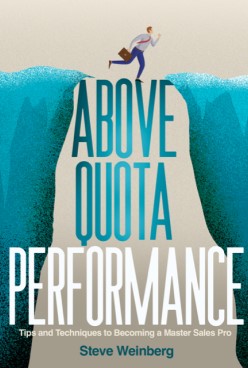
Steve Weinberg. Above Quota Performance. Armin Lear, 2022.
I confess that I bit at the opportunity to read this book. Its subtitle reads Tips and Techniques to Becoming a Master Sales Pro. So Above Quota Performance is about sales. I was the manager of a bookstore for about six years, and before that I sold dictionaries door to door. I knew some of the sales literature back in the sixties and seventies. I was curious to see how this compared with Earl Nightingale, Zig Ziglar, or Dale Carnegie.
There is little to compare. Those three authors as I recall them were more like pep talks. They emphasized speaking and presentation and were largely motivational pieces. I did appreciate them, especially when doing door to door sales. Anyone selling door to door gets used to rejection and sometimes needs some motivation to not give up. To have someone say to you, “Keep going!” or “Eyes on the prize!” can help. But most of what I learned in selling I learned from experience and from listening to people with more experience than I had.
If readers want to learn from a truly experienced salesperson, read Above Quota Performance. The contents are the equivalent of a college course. Indeed, some college business departments may choose to use this book as a text in a class on sales. This does not have the motivational factors (some would say clichés) that other sales books have. This is one hundred percent practical advice given from the voice of experience.
The author worked in sales for various corporations, so this is geared more for corporate sales rather than retail sales like the kind I did. Still, there is a recurring message: The purpose of sales is to help the customer solve a problem. Nearly all the advice the book gives—and there is a list of 60 Takeaways plus 11 Bonus Tips—focuses on the customer.
…I realized that what was important to me (perhaps features that were emphasized to me by our product managers) was often not as important to the buyer. I needed to adapt. I became more of a consultative sales pro and tried to work with the buyer to help them determine the best solution for their needs. I also tried to educate them about alternative solutions that were available to them. That is when I went from being a very good product demonstrator to a sales pro. (257-258)
Since Above Quota Performance focuses on corporate sales, we learn different ways to find the person or people who really make the decisions on buying or spending in a company. Sometimes one connection may lead us to the people who really have the power. At the same time, people who do the purchasing are often generalists and may not see the importance of specific features in a product or service. Weinberg tells us how to overcome these problems and make the right connections.
The author frankly admits that even with the right connections, we do not always get the sale. But if we have been honest throughout and have done more listening than talking, they may remember us the next time something comes up.
One chapter that stood out because Weinberg really emphasized its importance, was about using LinkedIn. Keep in mind that LinkedIn is primarily a business and occupation site, not a social network like Facebook, Instagram, or Tik Tok. He shows what to do—and what not to do—on this site. I found this chapter helpful to understand the various emails I get from LinkedIn. Be professional.
This book is very thorough. I suspect that someone may want to use it not just as a source for some ideas but as a reference. Chapters entitled “The Best Questions to Ask” and “Acing the Presentation” share many ideas to help the customer. It would probably be a challenge to memorize all the questions or all the details, but it would be great to refer to in order to refresh one’s mind before a presentation. Maybe they would help afterwards, too, to see what one might have done better.
There is also an interesting chapter on the personality of a salesman. Unlike some of the other works on sales, Weinberg does not believe that only certain personality types can be successful salespeople. While he gives a list of thirty desirable traits, he admits that not everyone has them all, and some traits that might seem liabilities can be used to an advantage. Even sometimes an introvert can sell successfully if he or she understands the needs of the customer. After all, Weinberg tells us, pushy people make most of us uncomfortable.
He also recommends to not be afraid to ask a contact why they did not buy your product. If done wisely, we can learn a lot about our own sales practices, about the contact’s corporate culture, and their company’s needs. There is always a next time.
Other chapters include thorough discussions on competition, pricing, and value. While the material here would be effective enough for a college course, the proof, as they say, is in the pudding. As the title suggests, readers will discover a great supply of material and examples to help sell above the quota. Who can argue with that?